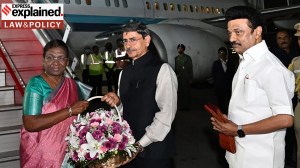IT.com: village kids show off IQ.com
‘‘Its original name was the Galvin Manufacturing Company. What is it known as today?’’‘‘Motorola!’’T...

‘‘Its original name was the Galvin Manufacturing Company. What is it known as today?’’
‘‘Motorola!’’
The answer comes within two seconds, ringing clear and confident to the 3,000 people gathered under a giant tent to watch the finals of a quiz, conducted in Kannada and English, for rural school children from all over Karnataka.
Two ninth-standard girls have just provided the answer to Quizmaster ‘‘Pickbrain’’ Giri Balasubramaniam, chosen for his fluency in both Kannada and English. The girls are from Mandya, where as they speak, farmers angry at the release of water to Tamil Nadu are burning government jeeps and cars.
It’s old news that beleaguered Chief Minister S.M. Krishna replies to his e-mails through a battery of IAS officers mostly. But what isn’t adequately known is the unconscious radiation of Karnataka’s IT mania through the population. There are no figures to indicate how deep this awareness goes. It only shows up at times like these where a mix of regions, religions, professions and income groups come together.
The contestants at the third annual edition of the Rural IT quiz (sponsored by Tata Consultancy Services and the state government) are a mix of Hindus and Muslims. To get here, the finalists had to get past more than 42,000 other students from schools strictly beyond the city limits of Karnataka’s major towns.
In the audience, there are severe looking ammas, resplendent in heavy silks. It turns out they are cheering squads of relatives. There are students from a local madrasa. When asked if they have computers at the madrasa, teenager Abdul Kareem, raises an eyebrow in disbelief. In Dakhni he says, ‘‘Is shahr mein IT nahin seekhenge to kya karenge? Gharmaich rehna ji! (What will you do in this city if you don’t study IT? Stay at home!’’
Another question. ‘‘John Hawken inscribed the idea for this on a piece of wood. It was the prototype of which device?’’
This time the answer is beyond the ken of the girls, or the boys — from obscure towns like Gulbarga, Gadag, Raichur, Tumkur and Bellary.
‘‘The palmtop!’’ The answer comes from Srikrishna, a mild-looking, middle-aged man in a dhoti and bush shirt. It turns out he’s from turbulent Mandya too, a prosperous retired farmer. He ‘‘drifted in’’ during a visit to his daughter.
Next to him, a tall, rangy police inspector with a .38 revolver on his hip, clunks his walkie-talkie against his head. ‘‘Sheeeh! I thought it was the silicon chip.’’
The inspector is actually part of the security detail of the Governor, who’s somewhere in the audience. The officer spends the next hour shouting answers whenever questions are thrown open to the audience, whenever he’s not checking on the deployment of his men on the walkie-talkie. Four of those men are huddled near the entrance. The contestants look like specks — the stage is nearly 50 metres away — but their attention is unwavering.
‘‘Who is the power behind the quiz?’’ The question is in English.
One young constable eagerly tells his colleagues: ‘‘Baruwaga nodide appa naanu (I saw it while coming in).’’ He frowns, then beams. ‘‘Haanh, Planet Asia!’’
These are not scenes and conversations you are likely to witness elsewhere in India. Bangalore’s tech industry may be struggling to climb out of the trough of disillusionment, but it’s quite clear a generation of locals is imbibing the spirit of technology in some form or the other. The trickle-down effect, while far from universal, is manifest in growing spheres of life. Bangalore itself is home to India’s first cyber police station, which has now taken 14 cases of tech offences to trial. And last month, the local police’s online fingerprint verification system was responsible for the 100th offender being nabbed.
Three months ago, Karnataka launched India’s largest land-records project, Bhoomi (land). A humungous 20 million land records are now online, freeing millions of farmers of an endless, corrupt wait for a document vital to land sale, crop loans and myriad aspects of rural life. In time, says Rajiv Chawla, the IAS officer who’s the brains behind the project, Bhoomi will not just empower farmers.
The statewide network if kiosks will likely engender a surge in tech awareness. Even if farmers don’t understand how it works, they will want their children to understand.
Photos


- 0119 hours ago
- 0210 hours ago
- 0319 hours ago
- 0419 hours ago
- 0520 hours ago





























